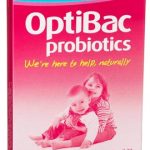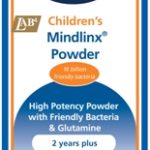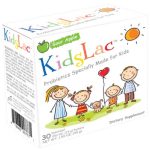The popularity of probiotics seems to grow by the day. And for good reason. In being the ‘good bacteria’ required by the body to balance the ‘bad bacteria’ in the gut, they can do each and every one of us a great deal of good. But, for all that, many people only look on probiotics as something for adult consumption. For some reason then, they’re not associated with the health of children as much as they might be. Is there any good reason for this? Quite frankly, no; because probiotics can be ideal for kids – and do them just as much good as they do adults.
Microbiota in infants and children
The microbiota (or the microbiome) is an umbrella term for the cacophony of commensal microorganisms that live inside and on our bodies. The significance of them to kids’ health is that they’re universal. They’re ‘good bacteria’ that aids in the digestion of food and – using the nutrients of food – the creation (or synthesising) of vitamins, but not just for adults; for children too.
Indeed, the microbiota begins developing when a baby’s in its mother’s womb, before evolving in infancy and the early stages of childhood. As it develops, a child’s microbiota plays a critical role in shaping the development of immunity, specifically intestinal mucosal defence. To that end, it’s often been posited that, should the microbiota not develop properly or run into problems during childhood, conditions such as asthma, allergies, autoimmune diseases and even type 1 diabetes may be more likely to occur in a person several years down the line.
Gastrointestinal and respiratory conditions
Logic dictates then that the ‘good bacteria’ of children’s microbiota can only benefit from the additional ‘good bacteria’ of probiotics. Indeed, clinical studies have revealed certain probiotics may reduce a bout of diarrhoea in a child by 25 hours, roughly one-third its usual duration1. The best probiotics to seek out for this treatment – especially of acute gastroenteritis – appear to be Lactobacillus GG and the yeast Saccharomyces boulardii2.
Moreover, these two probiotics are also among those to have shown promise in reducing – even halving – the likelihood that children being treated with antibiotics for an ailment will end up suffering from diarrhoea3, 4. Another gastrointestinal condition that probiotics are thought to be able to treat among the young – specifically premature and underweight babies – is necrotising enterocolitus5. Potentially fatal, this disease sees bacteria invade the wall of the intestine and, should it be allowed to develop, can cause such serious infection and inflammation that the bowel wall may eventually be destroyed.
There’s also research out there suggesting probiotics may help prevent children’s respiratory infections. A number of trials – the majority focusing on child subjects – have found that probiotics including Lactobacillus GG halve the risk of upper respiratory infections. And the trials also found that among kids who had developed such infections, one-third didn’t require antibiotics thanks to taking these probiotics. That said; the studies’ findings weren’t able to entirely identify the efficacy of one probiotic over another here, which may explain some doctors’ wariness in recommending routine use of probiotics to prevent respiratory infections7.
Aiding allergies?
Finally, it’s worth addressing the chatter there is around whether giving probiotics to children will help treat pre-existing allergies, asthma and autoimmune diseases. It’s only fair to say this is a controversial subject in children’s health. While many assert these complaints appear to be on an upward trend among the young living in developed countries7, perhaps because infants and kids aren’t being exposed to certain ‘good bacteria’ as much as their forebears were (due to better sanitation, less exposure to bacteria-carrying animals and livestock, higher antibiotic use8 and more Caesarean-section births; the latter instance supposedly ensuring babies don’t receive ‘good bacteria’ from their mothers9), not every expert is convinced by the theory.
And, running with that, the research into whether, in helping restore kids’ microbial balance, probiotics can redress these allergy/ asthma/ autoimmune issues is in its early stages, unfortunately. So it’s difficult to say yes definitively. Time will tell on this question, it seems. What does appear to be true, though, is that giving babies probiotics may well reduce the chance of them developing eczema10 – which, in this particular area, is surely welcome news for parents.
Choosing probiotics for your child
By taking a quick look around our site, you’ll discover we stock a good number of highly reputable probiotics for children, all of them containing terrific health-giving properties. Indeed, by way of example, here are just three such probiotics available to buy from us at The Finchley Clinic:
Optibac Probiotics for Babies & Children (90 sachets) – suitable for infants from six months and up, this probiotic supports the development of friendly bacteria for good digestive health and boosting natural immune defences and energy.
Children’s Mindlinx (powder/ 60g) – a high-potency live bacteria supplement comprising Lactobacillus acidophilus, Lactobacillus acidophilus, Lactobacillus rhamnosus, Bifidobacterium bifidum and Bifidobacterium lactis, along with added glutamine (an amino acid that’s crucial for healthy human muscle and plasma).
Kidslac (30 sachets) – essentially a children-friendly version of our highly popular products Threelac and Fivelac, Kidslac contains five different strains of healthy bacteria (including the DDS-1 strain of Lactobacillus acidophilus) in a delicious sour apple-powder base.
References
- Guarino A., Guandalini S. and Lo Vecchio A. ‘Probiotics for Prevention and Treatment of Diarrhea’. J Clin Gastroenterol. 2015 Nov-Dec; 49 Suppl 1:S37-45. doi: 10.
- Guarino A., Ashkenazi S., Gendrel D., Lo Vecchio A., Shamir R. and Szajewska H. ‘European Society for Pediatric Gastroenterology, Hepatology, and Nutrition/ European Society for Pediatric Infectious Diseases evidence-based guidelines for the management of acute gastroenteritis in children in Europe: update 2014’. J Pediatr Gastroenterol Nutr. 2014 Jul; 59 (1): 132-52. doi: 10.
- Johnston B. C., Goldenberg J. Z., Vandvik P. O., Sun X. and Guyatt G. H. ‘Probiotics for the prevention of pediatric antibiotic-associated diarrhea’. Cochrane Database Syst Rev. 2011 Nov; (11): CD004827. doi: 10.
- Hempel S. PhD, Newberry S. J. PhD, Maher A. R. MD, Wang Z. PhD, Miles J. N. V. PhD, Shanman R. MS, Johnsen B. BS, Shekelle P. G. MD, PhD. ‘Probiotics for the Prevention and Treatment of Antibiotic-Associated Diarrhea: A Systematic Review and Meta-analysis’. JAMA. 2012; 307 (18): 1959-1969. doi: 10.
- Alfaleh K. and Anabrees J. ‘Probiotics for prevention of necrotizing enterocolitis in preterm infants’. 2014 Apr. doi: 10.1002/14651858.CD005496.pub4.
- Williams K. and Tang M. ‘Probiotics may prevent upper respiratory tract infections, but should we recommend them?’. 2012 Oct. doi: 10.1111.
- Okada H., Kuhn C., Feillet H. and Bach J-F. ‘The ‘hygiene hypothesis’ for autoimmune and allergic diseases: an update’. Clin Exp Immunol. 2010 Apr; 160(1): 1–9. doi: 10.1111.
- Alm B., Erdes L., Möllborg P., Pettersson R., Norvenius S. G., Aberg N. and Wennergren G. ‘Neonatal antibiotic treatment is a risk factor for early wheezing’. Pediatrics. 2008 Apr; 121 (4): 697-702. doi: 10.1542.
- Bager P., Wohlfahrt J. and Westergaard T. ‘Caesarean delivery and risk of atopy and allergic disease: meta-analyses’. Clin Exp Allergy. 2008 Apr. 38 (4): 634-42. doi: 10.1111.
- Cuello-Garcia C. A., Brożek J. L., Fiocchi A., Pawankar R., Yepes-Nuñez J. J., Terracciano L., Gandhi S., Agarwal A., Zhang Y. and Schünemann H. J. ‘Probiotics for the prevention of allergy: A systematic review and meta-analysis of randomized controlled trials’. J Allergy Clin Immunol. 2015 Oct; 136 (4): 952-61. doi: 10.1016.



